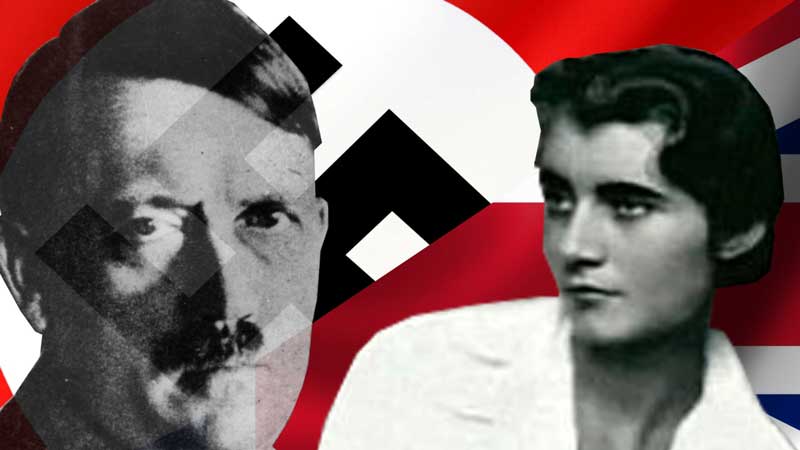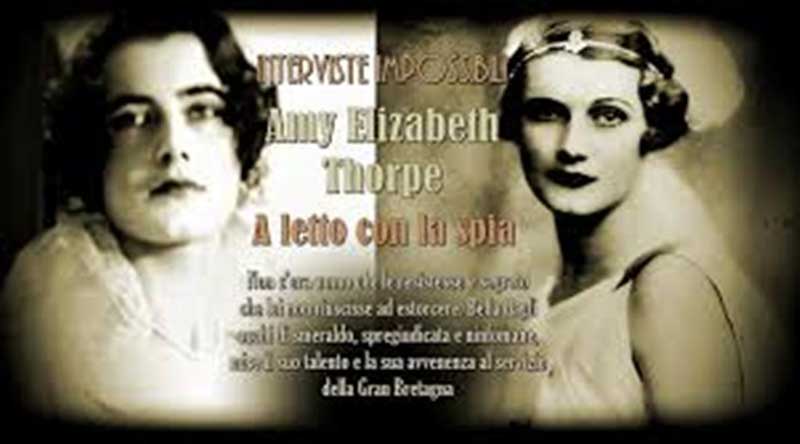
Amy Elizabeth ‘Betty’ Thorpe was born on 22 November 1910 in Minneapolis to Colonel George C Thorpe and Minnesota state senator Cora Wells. By the time Betty was 9 years old she was well traveled, having lived in Cuba, Rhode Island, Florida as well as Hawaii, as her father an officer in the United States Marine Corps. She was a blond, pretty and highly intelligent girl, who could absorb ideas and languages quickly, but grew bored easily. Her family moved to Washington DC, when her father resigned from his post and began to study maritime law in 1929.
However, Betty’s heart longed to go back to Europe. A loner by nature, she did not have a close relationship with any other girl, which marked her as different from the other kids at her school. Gradually she began to rebel, flouting the rules and decorum of the school and was expelled from a school for setting a bad example. At the tender age of eleven, she wrote a little book called Fioretta, about a blind girl, who used to sing on the streets of Naples. Somehow, it drew the attention of the Italian embassy. They contacted her family and with their consent, adopted her as a pet. While Betty was at boarding school, they used to meet her for tea, which caused quite the stir amongst her classmates.

Strangely, though her parents were college graduates, somehow they did not dare to encourage Betty to go to college. Instead her mother introduced her to the Washington society when she was only 19 and made sure her daughter was invited to all the important social events in the city, which were often attended by diplomats from various countries. Soon, her beauty and conduct made her a popular figure in Washington's diplomatic circle. By that time, Betty had grown tall, and willowy, with amber blond hair and flashing green eyes. Her secret weapon was her cool demeanor and soft, but teasing voice. However, underneath her seeming coolness, she craved excitement.
She was a sexually precocious girl and had an unabashed love for sex. As she found herself pregnant at 19 and was unsure about the father of her unborn child, she became desperate to find a respectable husband in an ingenious way. Arthur Pack, an under-secretary at the British embassy, who was 38 and twice her age, was one of her admirers. During a weekend party, she crept into his bed and waited for him to enter the room. The rest of the story is blatant. When they were married on 29 April 1930, Betty was four months pregnant. Arthur was shocked, as he did never imagine facing such an embarrassing situation. He expressed his concern to his wife that a baby born only five months after the wedding would ruin his career and convinced her for a long honeymoon, which allowed Betty to give birth abroad. Immediately after the birth of a son on 2 October 1930, the baby was packed off to foster parents, whom Betty would not see again for several years.

However, their marriage was a mismatch, as Arthur Pack was far too dull to satisfy Thorpe. Besides the age difference, they were temperamentally different. While Betty was impassionate, romantic and vibrant, Arthur was emotionally unavailable. Betty was ideally the perfect wife for a diplomat, as she entertained people to promote her husband’s career, and picked up languages easily. But, she grew bored. Looking for excitement, she began to cheat on Arthur, even after the birth of a daughter Denise in 1934.
On the eve of Spanish Civil War, when Arthur was transferred to Madrid in 1936, Betty followed him and took her tentative steps to help the Nationalists. With her connections through her husband's colleagues at the British embassy, she started an affair with a clergyman, helped to smuggle five Nationalist leaders to safety, arranged to transport Red Cross medical supplies to Franco’s forces and coordinated the evacuation of the British Embassy staff from Northern Spain. With the help of one of her lovers, Betty tried to get information about another former lover who was being held by the Loyalists. Using her feminine wiles, she managed to get seventeen prisoners released from the Loyalist prison in Valencia including her lover. However, she was denounced to her Nationalist friends as a Loyalist spy, probably by a jealous woman.
Arthur Pack was transferred to the British embassy in Poland in 1937 and again Betty followed him, along with her burning desire for illicit love outside of her marriage, associated with forbidden excitement and adventures. Soon after their arrival, Arthur suffered a stroke and while he was recovering at a rehab facility on the Isle of Wight, Betty began an affair with a young Polish diplomat, who spilled information about Germany’s interest in the Sudetenland. As Betty passed the information on to an SIS contact at the British embassy, she was noticed by Sir William Samuel Stephenson of the British Security Coordination (BSC) in the winter of 1937, who recruited her to gather intelligence from her wide network of contacts. Stephenson never openly suggested her to use her sexual prowess to gather intelligence, but he hinted that her information might come from pillow talk. Betty happily agreed and through her relationship with the young Polish diplomat, she met her next target at a dinner party. He was Michel Lubienski, who ran the office for the Polish Foreign Minister Josef Beck. Betty seduced the man with her irresistible sex appeal, allowed him to make love as and when he wanted and learned that the Polish experts were working on decoding Germany’s Enigma enciphering machine. Apart from that, she obtained conclusive proof about Hitler’s intentions to dismantle Czechoslovakia, while she was traveling with Lubienski in Prague. But her Polish adventure ended soon, as Lubienski’s wife came to know about their affair and complained to Arthur Beck, who took it up with the British ambassador. As result, despite the valuable information that she supplied, she was asked to leave Poland.

After the fall of Poland, Arthur was appointed to the Embassy in Chile as the head of the commercial section of the embassy. For a short stint Betty worked as a journalist and offered her services to the SIS. She wrote reports about which prominent Chileans were Nazi sympathizers which were sent to London. By that time her marriage to Arthur had dissolved. Leaving Arthur and her daughter in Chile, she sailed to New York, where she went to work for the British Security Coordination, for operations in the United States. She was code-named ‘Cynthia’ and sent to Washington DC with the cover of a journalist, to obtain the Italian naval ciphers. Under the guise of the journalist, she made contact with Italian naval attaché Admiral Alberto Lais, who turned out to be one of her friends during the teens. Again, by using her oomph factor, Betty seduced him and extracted intelligence regarding the Italian order to sabotage all Italian merchant ships in US ports to prevent US capture. As advised by Alberto Lais, she contacted the cipher clerk directly and with a little bit of bribery, the cipher clerk gave the ciphers to be photographed and then returned to the Embassy.
After that, in March 1942, Betty was instructed to make contact with the Vichy-French figures in Washington. Again, under the cover of a journalist, she contacted Captain Charles Brousse, the 49 year old press attaché of the Vichy-French Ambassador Gaston Henry-Haye. During that time, Betty at the age of 32 was at the height of her beauty. and she easily gathered the necessary information with the usual way, through pillow talk. Sensing Brousse to be a staunch anti Nazi, Betty misguided him by saying that she was working for the Americans, not the British. This made Brousse to provide her with the embassy cables, letters and files. However, the British and the Americans further wanted the Vichy French naval ciphers. But, with the Vichy-French Ambassador Gaston Henry-Haye, the conventional sexual offerings failed to get her near her target, the French navy's code books. It was a difficult task, as the ciphers were in several volumes and locked in a safe. Ultimately, Betty had to resort to burglary. Betty and Brousse cooked up a plan to use his office for his affair, deluding the guard as to their actual reason for being at the Embassy late at night. Finally, in their third attempt, they became successful to drug the security guard and his dog using pentobarbital, although it involved Betty and Brousse hastily undressing when Betty sensed that the guard was on his way. Catching them in compromising situation, the watchman hastily apologized and went back down to the basement. After that, the French Navy's code books were thrown out of the window of the embassy to a waiting Federal Bureau of Investigation agent, who photographed them and returned them within an hour. The French codes were used to plan operations in North Africa.
Much later, after the end of the Great War, when Betty was asked if she was ashamed for what she did, she strongly denied on the ground that, wars are not won by respectable methods and her work saved thousands of British and American lives.

Worried about his health and depressed, Arthur Pack committed suicide after the war, in 1945. Brousse divorced his wife and married Amy Elizabeth ‘Betty’ Thorpe, the modern Mata Hari. He bought her the Château de Castelnou, a Medieval-era castle, in southern France, where they lived until Betty’s death in 1963 from throat cancer.
